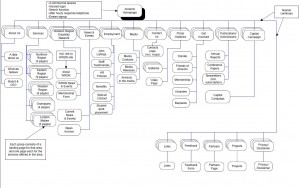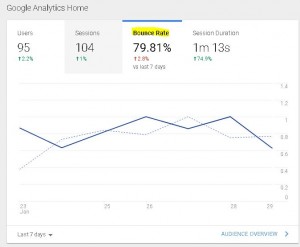First Part: Create Your Own Website
A website is still fundamental in today’s digital world. It plays a vital role to convey your message to the audience. It is also a medium to showcase your products and services to the target audience. In this very first part, we will cover various factors that you need to consider or know to create your own website.
- Why websites still matter: Our obsession with social media has made it easy to forget the fundamental role your website plays. Some digital marketing courses barely mention websites. Your website is likely to be the first impression for anyone who is actively interested in engaging with you. What impression is it giving? Is it current, attractive and easy to navigate? Is it fast to load? Does it offer added value such as videos, e-Books or podcasts? Does it answer the questions visitors really have? What do people think when they “check you out” online?
- Turn your website into an employee: Your website should be treated as an employee – one that works for you 24 /7 in a range of roles that no human could fulfill. If you want more members, sales, booking does your website facilitate them? More importantly, does it persuasively argue why people should become a member, customer or client?
A good website maximises the chances of browsers becoming buyers. If properly integrated into your other digital systems it also reduces administration for human staff. Your website should explain, persuade and sell. It should make you the brand by which others will be judged. How hard is your website working for you? Not hard enough. - Sitemaps for simple navigation: Too many websites are tests of one’s psychic abilities. Visitors want to find what they want to find – now! A good sitemap organises, categorises and prioritises your information. The best sitemaps create predictable, boring, easy-to-use websites. They don’t hide contact details within the About Us section. They have separate Publications sections where every document from annuals reports to whitepapers are found and they create stand alone News sections where the latest happenings can be found.
A well-thought out sitemap is a huge boost to your search engine results as Google is better able to understand what each page is about. - Functions and features your site needs: Bells and whistles can lift your site out of the ordinary. Nursing homes need to explain complex financial details – can you do this with an online calculator similar to those used by mortgage lenders?Can you gain credibility by creating and embedding videos or audio? Would you gain more donations with better online donation software? (Yes you would.) If you are selling something physical – a room for hire or a sports show – how well do you display it? Can I see it from every angle in all the colours? Some features are hidden from view – learn which apps will make your website easier to back-up, update, and monitor.
- Content management systems: The geekiest question you’ll ever ask is: what content management system (CMS) should we use? The CMS is the technology you use to operate your site – how to add a page, image, text, navigation. The choice of CMS will determine whether you love or hate your site in two years time.
It will influence how well you can integrate your site with future technologies and the breadth of choice you have for any desired functionality.
Do you opt for WordPress or an alternative CMS? Some CMS choices will limit the developers you can hire. Few developers will even raise the issue – they want to build your site in the CMS they prefer. This might not work for you.
Note – if your favoured website developer recommends his or her own CMS – cancel your meeting. - Building repeat traffic: Every website should handle the first-time visitors with aplomb; understanding their needs and clearly meeting your goals. The best websites are worth visiting more than once. These have news and events that are constantly updated. The best websites gain repeat visitors because that’s where one books appointments, make payments or make contact with the organisation. Creating a site with ongoing visits in mind leads to a site that adds more value, to more people, more often. It also gets a far better ROI.
- Selecting a website developer: No other digital marketing workshop handles this so bluntly. Selecting a website developer is a lot like choosing a home builder. They know stuff you don’t, they have their preferred ways of doing things and they assume you’ll be happy with their standard offering. They rarely explain the complexities you will encounter nor do they care about search engine optimisation or copy. They just want a site that looks good and works well. My workshop will make you a more discerning and ultimately more satisfied customer.
- Google Analytics: Most people rarely look at their Google Analytics accounts. Fewer still act on the data Google provides. The free service lets you know how well your site is performing. How are people finding you? What pages do they like and which ones make them leave? How long do they linger and how far do they roam?
Google Analytics offers a tsunami of data much of which will be surplus to your requirements but it is a superb tool. If used and acted upon you will find yourself with a harder working website and happier visitors.
- Online copywriting: Copywriting for the web is different to writing for print in some ways, similar in others. Every copywriter should have a strong grasp of SEO. They should also take great pains to understand the motivation of the visitor. Chances are your copy isn’t detailed enough, leaving visitors confused. Do you ‘introduce’ your staff?Do you explain your course structures and payment options? You should. It’s also likely your copy doesn’t specify an action to take. We can help fix that.
- SEO – get better Google results: You’re probably looking at this site because Google recommended it. Of my 13 websites, all but one are one page 1 for the appropriate searches. Without this site clearly sending Google the right signals about what it is and what it isn’t you’d be considering my competitor – a disaster for you and me. SEO – search engine optimisation – is a fulltime job but we cover the basics that help Google understand and recommend you – tags, copywriting, URLs, domain credibility, links, keywords and more. Of all the errors my clients have made, it is not paying enough attention to SEO that costs them business. Huge SEO improvements can be made, usually at little cost. Google is the greatest referrer you’ll ever have – exploit it.




We offer more
Brett offers many more services through Hootville Communications
View ServicesStay connected
Get all the latest news on media, marketing, online comms and campaigning
Contact us
Call Brett on 0414 713 802 or alternatively email brett [at] hootville [dot] com
Visit Hootville